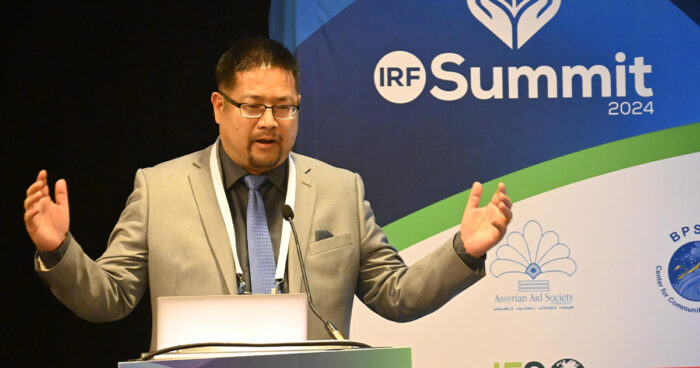
As the Chinese government continues to cover up its repression in Tibet, an international religious freedom summit in Washington, DC last week shined a light on China’s ruthless occupation of its Himalayan neighbor.
“Today we don’t hear much about Tibet. And the reason is exactly because it’s the least-free country on Earth,” Namgyal Choedup, representative of His Holiness the Dalai Lama and the Central Tibetan Administration to North America, said at the IRF Summit 2024.
Namgyal was one of the main speakers at the summit’s breakout session on violations in surveillance states. UN Special Rapporteur on freedom of religion or belief Nazila Ghanea and Campaign for Uyghurs Founder and Executive Director Rushan Abbas also spoke on the panel, which the International Campaign for Tibet developed with Boat People SOS and the Campaign for Uyghurs.
Tibet was also a focus of the summit’s panel discussion on challenges and opportunities in freedom of religion or belief in Asia, which also brought attention to the situation in Nepal, including for Tibetan refugees, and the situation in Sri Lanka. ICT’s Franz Matzner moderated the panel.
Surveillance in Tibet
During his remarks, Namgyal addressed the massive surveillance state and security infrastructure that China has built in Tibet.
He noted that from 2011-16, Chinese official Chen Quanguo was the Chinese Communist Party secretary of the Tibet Autonomous Region, an area that spans less than half of Tibet.
During his tenure, Chen developed a system of mass surveillance and militarization that has only grown since. Chen later moved to East Turkestan (Xinjiang), where he was the architect of China’s Uyghur genocide.
Inside Tibet today, “what we have is kind of reminiscent of the Cultural Revolution period,” Namgyal said, referring to the decade of bloody purges led by Chairman Mao Zedong.
Namgyal said China has even forced Tibetans to spy on one another. And it has largely shut down access to Tibet from the outside world.
When Tsewang Norbu, a popular Tibetan singer, committed a self-immolation protest last year, Beijing almost immediately turned off internet access to prevent the news from spreading.
“We don’t know whether that 25-year-old singer is alive or not,” Namgyal said of the immediate aftermath (it was later discovered that Tsewang died following the self-immolation). “That’s the collective punishment.”
Namgyal also mentioned receiving reports of a Tibetan university student named Tsedon in the Tibetan capital of Lhasa who was detained by Chinese authorities on Dec. 26 last year and reportedly died in police detention on Jan. 15. Namgyal said it is difficult to verify the report because of China’s tight controls and shutdown of information flow, which shows how Tibet is so tightly surveilled and monitored that it’s nearly impossible for the rest of the world to know what is really happening there.
Western complicity
China is now implementing a policy of Sinification in Tibet, which seeks to eliminate Tibetans’ unique civilization by forcing them to give up their language, religion and culture.
“The Communist Party of China has ruled Tibet for over 60 years, and still they haven’t been able to win the hearts and the minds of the Tibetan people …” Namgyal said. “They figured that it was the language, the culture that needs to be tackled so the Tibet issue won’t be a problem.”
China relies on advanced technology to suppress Tibetans’ freedoms. Unfortunately, much of that technology comes from Western corporations.
Namgyal noted that, following sustained protests by Tibet activists and other groups, US-based Thermo Fisher Scientific recently announced it had stopped selling kits reportedly used for mass DNA collection in the Tibet Autonomous Region. According to reports, China’s police have collected DNA from about 1 million residents of the region.
“For the Tibetans, it’s really a huge challenge when the whole country has been locked down,” Namgyal said, “and that lockdown happened because of the use of technology and huge investment in that infrastructure, both the technology and the human intelligence.
“It’s basically what they say: nets in the sky and traps on the ground.”
Importance of religious freedom
Namgyal and the other speakers also addressed the importance of religious freedom.
Ghanea, the UN special rapporteur, said: “The last bastion of independence is the freedom of conscience, the soul’s freedom to aspire to what it believes in.”
Abbas, the Uyghur American activist, said: “All of these dictators and the surveillance states target religion because religion is the most basic fundamental right.”
She added: “Religion is what gives us the resilience and the fight onwards.”
Watch the IRF summit breakout session on violations in surveillance states.

